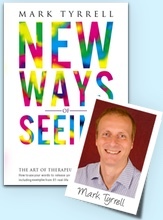
Help your clients break out of the distorted thinking patterns of jealousy and see clearly
“Jealousy, that dragon which slays love under the pretence of keeping it alive.”
– Havelock Ellis, English writer and social reformer, 1859–1939
“I mean, why does she even have male friends!”
Frown lines tapered down Kevin’s forehead, little trenches of deep tension. The self-tormenting man sighed heavily.
“But then of course, why shouldn’t she?” It was as though the rational part of Kevin’s mind was trying to reason with the part that had broken free of rationality, the part that was floating in the far reaches of unfettered feeling.
“I mean, part of me knows she’s loyal and honest?” He said it as if it were a question. “I really don’t want to drive her away, Mark?”
Of course, the destructive effects of jealousy don’t just torment the partner most prone to it.
How the green-eyed monster ravages relationships
In a sense, there is no real relationship when chronic jealousy rears its tyrannical head.
If you are trustworthy yet not trusted, decent yet continually accused of relationship subterfuge, and constantly spied upon, then a sense of togetherness and real intimacy is driven out.
Kevin had been with his partner Rachel for three years. He had kept his jealousy in check for the first few months or so, but these days he interrogated her constantly. The painful fact is that when you are looking for signs of something, you tend to find them. Or think you’ve found them. An uncontrolled imagination is great at finding ‘evidence’.
“She jokes I’m like the Gestapo!” He looked as though he were well and truly fed up with himself, then added, “Many a true word spoken in jest, eh?”
For some, a relationship can feel like a tight and repressive regime. We may end up living in fear of saying or doing the ‘wrong’ thing lest it be given a meaning we never intended.
Kevin had taken to texting Rachel’s friends to check she was really with them, calling her when she was out to lunch, even checking her social media accounts (hence the comment about male friends, whom she’d known from university).
Kevin would routinely become enraged if Rachel seemed to even glance in the general direction of another male. And he’d worry endlessly that his obsessiveness would drive her from him. At last, I thought, we’d found a reasonable worry!
Jealousy not uncommon
Chronic jealousy within intimate relationships is quite common and, if left uncontrolled or untreated, can lead to violence.
In one study, both 15% of women and 15% of men reported that they had at some time in their relationship been the object of violence from a jealous partner.1
Kevin told me shamefully that he had, once or twice, been physically intimidating to his lover. He grew tearful as he said, “I had to stop myself putting my hands around her throat!” Clearly we had to work fast.
It’s important to see the emotional blend that makes up jealousy, as only then can we see effective ways to treat it.
The emotional hybrid of wanting too much
Jealousy is a hybrid feeling born from insecurity and possessiveness. Jealous people also often suffer from feelings of inadequacy – a belief that their partner is too good for them in some way.
It therefore may feel like it’s only a matter of time before the loved one goes off with “someone better”, as Kevin described it. “Who would be someone better?” I asked him.
“Just about anyone!” he said despairingly.
Actually, research found that jealous insecurity, in women particularly, was correlated with low self-esteem.2 So, certainly we may need to help our clients more generally with their self-esteem as part of a holistic treatment. Once we do this effectively, then they’ll have the happy ripple effect of more secure and happier relationships.
But because jealousy is so destructive to relationships, and healthy relationships are so important, we may have to prioritize breaking the patterns of jealousy as part of our work towards healthy self-esteem.
There’s also another pattern I’ve sometimes seen operating within jealous clients.
“You belong to me!”
Sometimes the jealous partner may have learned to view everything as their material possession, and human relationships become an extension of this materialistic mindset. They may have high self-esteem, even be narcissistic, and be so cynical about human nature that they feel everyone cheats.
It has been found, not surprisingly, that narcissists are more likely to cheat on their partners, and also less likely to trust others if they assume others are like them.3
If someone is viewed as an object, they can be ‘stolen’. You often find when this materialistic mindset extends to human relationships that the controller will insist on what their ‘object’ wears, what they do, even what they say, because, well, after all, that person is their property.
It’s a kind of ‘you belong to me’ sentiment. So, paradoxically, extreme jealousy may result from either an underentitled sense of insecurity or an overentitled sense of dominance. Behaviourally, though, the jealousy often presents the same.
The kind of narcissistic jealousy we see in the overentitled partner may be harder to treat, not least of all because the person may be less likely to seek help for it, feeling that it is all about the other person but not them.
The jealous partner, because they feel threatened, may have angry outbursts alternating with feelings of hopelessness and depression.
So how can we best help the jealous client? How did I help Kevin?
Which comes first, the thoughts or the emotion?
I’ve written about treating jealousy before, opining that jealousy is more a case of a disordered imagination than a so-called thought disorder. The thoughts of jealousy tend to both stem from and feed into the emotion. So when the emotion of jealousy is running too high we may need to calm the flames of feeling before we can deal with the thoughts.
This is why I believe every practitioner needs to know how to relax their client deeply in order to do effective cognitive therapy.
But this is not to say that the kind of thoughts that both stem from and in turn fuel jealousy are not important, too. Examining thoughts and challenging them can be an important way of helping calm the emotions.
‘Seeing through’ the kind of thought distortions that stem from feelings of jealousy can help clients gain distance on their own automatic perceptions and thereby ‘buy into them’ less. We can help our clients develop their ‘observing self‘.
So what are some of the common thought distortions of jealousy?
Thought distortions common in jealousy
Here are some of the kind of thoughts that can accompany the self-torturing imaginings of jealousy:
All-or-nothing thinking
- “I can never trust anybody!”
- “I have to know absolutely that he loves me 100%!”
- “If she leaves me my world will end!”
We know that the more emotional problems someone has, including depression and anger, the more all or nothing, black or white, or ‘absolutist’ their thinking and language becomes.4 You’ll often hear your jealous clients talk in extremist terms.
Fatalism
- “Everyone cheats on me in the end.”
- “It’s only a matter of time before she finds someone else!”
One flavour of absolutist thought is fatalism. The prevailing perception here is that the future will, in fact, must unfold in the worst way possible. To your client, it may feel inevitable that the loved one will abandon them, and they are just trying to cling onto them for as long as possible.
Globalization
- “No men can really be trusted!”
- “Everyone leaves me in the end!”
Sometimes the jealous client has been hurt before. Perhaps a previous partner, or even their current one, cheated on them, or a past love abandoned them unexpectedly.
The distorted logic of emotion may have them overgeneralizing or ‘globalizing’ this negative. Exceptions to this globalizing perception may be missed or discounted by the client. One person treated me like this = NO ONE can ever be trusted.
Internalization
- “People must think I’m such a fool!”
- “Why do these things always happen to me!”
- “Do they think I’m a mug or something!”
Jealousy can be a curious mix of blaming the other person (or all other people – globalization) and internalizing causation. So your jealous client may not only externalize but also internalize. They may feel there is something about them that leaves them more likely to be mistreated or abandoned. Of course, if they are extremely needy then there might be.
And finally…
Misuse of the imagination
- “I imagine her kissing her co-worker and I get so mad!”
- “He hasn’t called me. I can just see him with that attractive woman from accounts!”
- “I can tell she’s falling out of love with me!”
We know that chronically jealous clients misuse their imaginations. They may create images of their love object kissing, making love to, or giving intimate emotional attention to someone else. We need to help our clients disentangle imagination from reality and begin to feel calm around the theatre of their own imaginings.
Thought and imagination disorders tend to produce and maintain the behavioural clusters associated with jealousy, such as over monitoring, constant reassurance seeking, angry outbursts, and attempts to control what the partner does. So with all this in mind, here are a few approaches we can use with our jealous clients.
CBT Technique one: Challenge the absolutism
We can help our clients be less extremist in their thought. One way to do this is simply to describe how uncontrolled emotion produces simplistic and extreme thoughts which drown out more subtle shades of perception. Kevin, in his third session, told me he had started seeing his all-or-nothing thinking “from the outside” and felt he had more control over it.
He had been cheated on before, so I talked to him about fatalism and globalism. I had him list all the ways his current partner is different from the one who was unfaithful before. We even talked about how he could cope successfully if ‘the worst’ did happen.
So often absolutism has people feeling that ‘everything would be lost’ if what they fear comes to pass, without ever really examining that idea. Kevin began to feel more confident in himself. Of course he would survive, even though it might be tough. As he got better at relaxing he found that his mind could retain more flexibility, and the absolutism began to drop away.
We can also look at a type of reasoning that is common to jealousy sufferers.
CBT Technique two: Spot and challenge imagination-based reasoning
Making stuff up and believing it is common to humanity. It’s the flip side of the marvellous cognitive tool we have to invent and create. Imagination does a great impression of reality, which is why when we dream at night, it can feel totally real.
I jokingly talked to Kevin about a hypothetical court case in which the jury were encouraged to imagine all kinds of things about the accused and then use that as evidence (mind you, I’m sure that has happened!). But my point was that made up stuff was not evidence of anything, no matter how real it seemed in the mind.
We gently talked about imagination-based reasoning, and Kevin became skilled in being able to spot it within himself, as well as learning to suspend the workings of his imagination sometimes. Unfortunately, jealousy is seldom contained in the mind and often has real-world consequences.
CBT Technique three: Help them go on a monitoring diet
Jealousy isn’t just about feelings and thoughts, of course, but also behaviours, some of which can be extremely destructive to relationships. By helping our clients look at what jealousy has been making them do as well as feel and think we can start to build a plan with them to taper off the kind of behaviour that may have been damaging their relationship.
I asked Kevin to consider ‘letting’ his partner see her friends at least once a week and, while she was out, not contacting her in any way. He said he felt he could do that. We devised a plan for what he could do instead, which sometimes included meeting up with a friend of his own, and we mentally rehearsed these times while he was calm and relaxed.
We also worked on the way he communicated with his partner. He began to ask less about what she’d been doing, and learned to relax in not knowing where she was sometimes or where she had been. There had never been any evidence that his partner had been less than 100% faithful to him, and a part of Kevin knew that.
Bit by bit Kevin began to feel better about who he was as a person and confident that he was strong enough to survive even if he did need to be alone for a while at some future point. It most certainly wouldn’t be the end of the world.
Yes, we worked on earlier memories from his adolescence which had conditioned him to be clingy in relationships, but Kevin did find that being able to spot the thinking styles and stand up to his own tyrannical behaviours really helped him and the woman he loved so much.
Ultimately Kevin felt he’d learned strategies which would always help him. His relationship grew stronger, he was certainly happier, and I’m guessing his partner was too.
“Thank you for teaching me self-doubt,” he said jokingly to me in our last session.
I knew exactly what he meant. Sometimes the first step towards healthy self-esteem and confidence is in starting to doubt the lies and gross distortions of the emotionally conditioned mind.
Success reinforcement for a UPTV client
After the first session with Mark for workplace public speaking fears, this client has done a whole host of public presentations successfully. He even enjoyed it.
In this session the client says he just wants reinforcement of the progress. But he has also noticed he has some residual anticipatory anxiety in the lead up to presenting, even though he is fine when actually presenting. Mark seeks to bring that down and strengthen the changes.
This is a short session at only 34 minutes but it’s a useful example of success reinforcement. Members of Uncommon Practitioners TV can watch this session now, and if you’d like to join, you can click here to be notified when UPTV is open for booking.
Notes:
(1) http://easap.asia/index.php/find-issues/past-issue/item/511-v5n1-9501-p18-24
(2) https://www.ncbi.nlm.nih.gov/pubmed/8137108
(3) https://www.sciencedirect.com/science/article/abs/pii/S0092656697921759?via%3Dihub
(4) https://journals.sagepub.com/doi/abs/10.1177/2167702617747074










